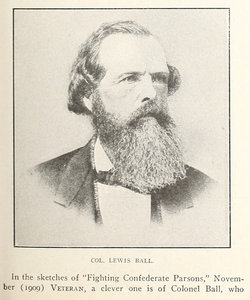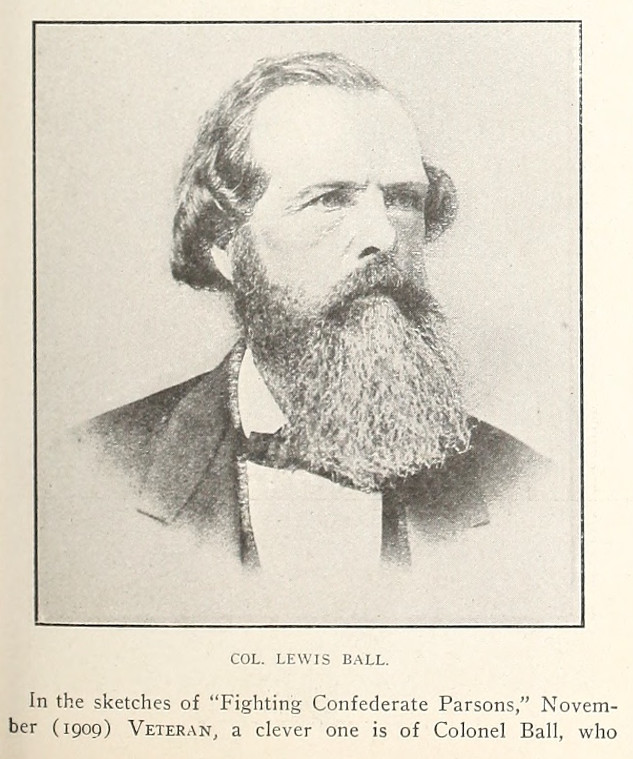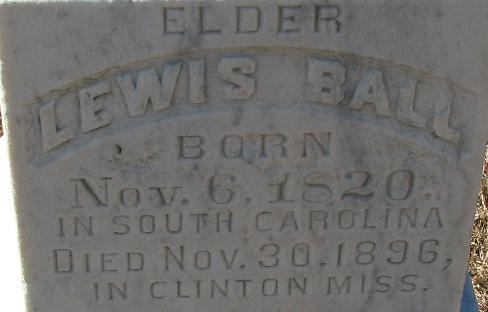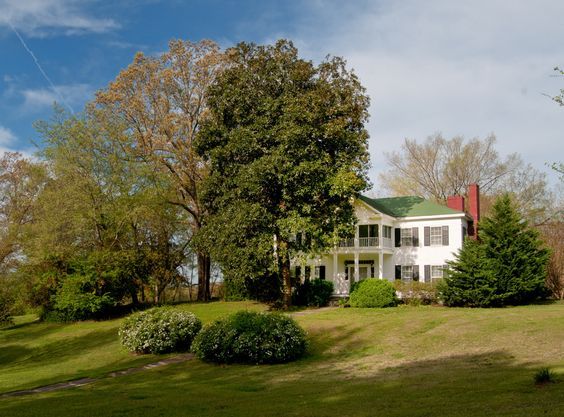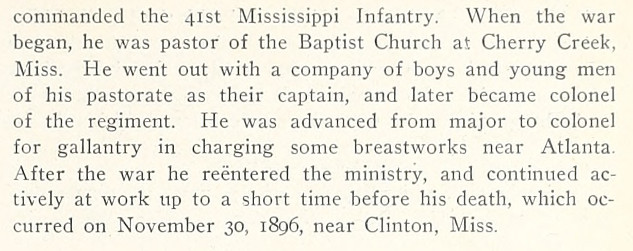After the war he re-entered the ministry, and continued actively at work up to a short time before his death with occurred on November 30, 1896, near Clinton, Miss. - source: Confederate Veterans Magazine, Feb. 1910.
Promoted Capt to Maj on 3/1/1864
Promoted to Col Mar 1, 1864 (same day)
Married: Mary Ann Hitt, Annie Suddoth and Adela Suddoth. Captain Company B 41st Mississippi, January 14, 1862 Surrendered 4/26/1865
Brief History 41st Infantry Regiment was assembled at Pontotoc, Mississippi, during the summer of 1862 and contained eleven companies. Its members were from the counties of Lee, Noxubee, Pontotoc, Monroe, and Chickasaw. The unit served in Mississippi, then was assigned to J.P. Anderson's, Henderson's, Tucker's, and Sharp's Brigade, Army of Tennessee.
It fought on many battlefields of the army from Murfreesboro to Atlanta, saw action in Tennessee with Hood, and was involved in the North Carolina operations. It lost 25 killed, 164 wounded, and 9 missing of the 502 engaged at Chickamauga. In December, 1863, it totaled 321 men and 219 arms. The regiment surrendered on April 26, 1865. Its commanders were Colonels Lewis Ball Jr., William F. Tucker, and J. Byrd Williams, and Lieutenant Colonels William C. Hearn and Lafayette Hodges.
March 1, 1864 wounded at Battle of Mount Zion Church near Marietta, GA 6/22/1864
Wounded Sept 18, 1864 Near Lovejoy Station, GA.
Wounded in action, (WIA) Kolb's farm by a shell fragment that broke his collarbone, unfitting him for further field duty. Colonel August 31, 1864
Post War Minister and farmer in Sunflower and Tippah Counties. Later moved to Clinton, MS. He died on his farm near Clinton. Buried Clinton City Cemetery.
Lewis Ball. This beloved man of God is one of the noblemen of the Baptist ministry of Mississippi. He is one of the patriarchs, whom every one delights to honor. But, although his work has been so valuable in the State, and has extended over so long a period of its history, he has not yet consented to furnish the data necessary in the preparation of a sketch of his life and work. His life has been one of activity and great usefulness.
Cathcart in his Baptist Encyclopedia, page 65, says of him- "Rev. Lewis Ball, an active and efficient minister in Northwest Mississippi, was born in South Carolina in 1820, came to Mississippi and began to preach in 1844. His abundant labors have greatly advanced the cause of truth. By his labors the Sunflower Association was established. He was a colonel in the Confederate army."
The first time the writer ever saw this man of God was at a revival meeting in the Starkville Baptist church in he summer of the first or second year after the close of the Civil War. This meeting was conducted by himself and Rev M. P Lowery, of blessed memory. To an mature Christian the preaching seemed to be excellent and of a character to awaken the unconverted. But to the surprise and grief of both of these men of God there was no movement of the un- converted.
It was discovered near the close of the meetings that there were troubles in the church. Mr. Ball, in one of MISSISSIPPI BAPTIST PREACHERS. 41 his talks, before a large congregation said: ''We have had our guns trained in the wrong direction during the past few days. We have had them trained upon the unconverted, whereas they should have been trained upon the members of this church; for there is where some shooting needs to be done. Brethren and sisters you are responsible for the failure of these services to reach sinners." For a number of years his labors were given to churches in the northern part of the State.
He was always instrumental in bringing large numbers of converts into the churches. This seemed to be his special work. He himself says that he did not give sufficient attention to the training of his members. He says: "My plan has been too much that of running after the sinner, and persuading and instructing him until I induce him to accept Christ. I would then take him down into the water, 'bury him with Christ in baptism,' bring him up out of the water, and leave him on the creek bank while I ran off after other sinners." This statement he once made to the writer. In about 1881 or 1882 he became the missionary of the State Mission Board to supervise all missionary work in the rich Delta country, which then began to attract the notice of Mississippi Baptists by reason of its fertility and destitution.
While his family lived in Blue Mountain he traveled over the territory now covered by the Sunflower and Deer Creek Associations on horse back and in "dug-outs" and preached the gospel in school houses, under forest trees, in private houses, around the fireside, wherever he could find any one hungry for the "Bread of Life" or any starving sheep of the Lord who needed to be fed. The people of that section all loved and honored Evangelist Ball because they had confidence in his piety and his desire to do them good. His memory is fragrant to-day all through the Yazoo and Mississippi Delta. Many Christians were helped on their way, many churches were strengthened or organized, and many souls reclaimed by his labors in the Delta. But his work was 42 MISSISSIPPI BAPTIST PREACHERS. pioneer work.
He "blazed out" the way for the present labor in this fertile country. In 1883, after the retirement of Rev. T. J. Walne from the secretary-ship of the State Mission Board, the Board, after casting about for a successor, finally selected Evangelist Ball for the place. As a missionary of the Board he had said in a speech before the convention in Sardis, in 1882: "The Mississippi Bottom must have the gospel if missionaries have to be buried there," That sort of a spirit and consecration fitted him to be the leader of the mission forces in the State. In as- much as he would not consent to move to Oxford, where the State Board was located, a good brother was recommended to the Convention of 1884, in Kosciusko, who would consent to move to Oxford. The name of Lewis Ball was replaced by an overwhelming vote of the Convention. He rode all over the State, visiting numbers of country churches on horseback, endeavoring to reach and enlist all the churches as far as possible. In this way he visited a church of which the writer was pastor in Jefferson county. He was greeted by a fair week-day congregation.
He captured all who heard him. In the course of his sermon he illustrated Paul's expression in Rom, 8, "More than conquerors." "During the Civil war we had a tiff with the Federals at Missionary Ridge. They routed our lines and forced us to retreat. They captured one of our batteries and turned it on us, and I never knew cannon to fire as rapidly in my life. A strange place that to study theology, but here was an explanation of my text, 'more than conquerors.' I had thought that to be conquerors was sufficient, but I saw then that to be more than conquerors, and turn the enemies' guns on them is far better." In 1885, Rev. J. B. Gambrell was made temporary secretary of the State Board as Secretary Ball insisted on giving it up.
During the next year he gave himself to revival meetings, and in the beginning of 1887 he was employed to work among the colored people. His plan of work among them was to endeavor to reach as many as possible of the colored preachers. He conducted the institutes and secured the ear MISSISSIPPI BAPTIST PREACHERS. 43 of as many of the preachers as possible. He did a very valuable work for this people in this way for several years, when the difficulties environing the work led him to give it. For several years past he has been living in Clinton in his own home, and giving his ministerial labors to adjacent churches for such remuneration as they can give. For a while, within the last few years he was pastor of the Clinton church. He is doing some of his best preaching in his last days, drawing upon a long experience and study of the Bible, in which he has been taught of the Spirit of God.
The ''outward man" is growing weaker, but the "inner man" is being renewed day by day. He is lingering in the mellow tints of the sunset of a pious life.
One anecdote: Once while Father Ball was secretary of State missions, he had an appointment with the Macon church. The pastor had to be from home at the time of the arrival of the train. He said to his oldest son: "Son, you must go to the train and meet brother Ball and bring him home, as I cannot be at the train," "But, papa, I do not know brother Ball; how can I meet him and bring him home?" The father said, "You go and wait for a man who looks like Moses, and bring him with you. That will be brother Ball." He went to the train and found the right man without any trouble.
In a letter addressed to Atty. B.W. Ball, Laurens, South Carolina, written by Lewis Ball, Jr., son of Lewis Ball, Sr. dated: Sept. 23, 1892 Clinton, Mississippi "I have mentioned your aunt Polly's name (wife of Thomas Hill) - She lived to a good old age. And when the Master's sickle came she was ready for the reaping. She had borne three daughters and two sons. Henry the oldest of the family married twice. I can't recall just now the name of his first wife. She left one child-a daughter. His 2nd wife was Ben Hitt's daughter. He was a member of my company and was killed in the first skirmish we had at Corinth. Leaving two children by his last wife. She is still living in this state. The other son's name is John. He is married - has several children and doing well - a fine citizen. Jemima married Neely Jones - son of Sam Jones who lived near to where you father died. He died just before the war closed - leaving a few children whose history I am not familiar with.
The Historic Hutchins House was built in 1877 by Colonel Lewis Ball, the first Minister associated with the new Baptist Church. (Now known as Lowery Memorial Baptist Church). The house was built 4 years after the founding of Blue Mountain Female College – for the purpose of boarding students for the school. In 1884, James Hutchins brought his family to Blue Mountain and bought the home. His daughter, Mabel, studied at Blue Mountain College.
[Biographical information provided by LisaBee, Texas and Richard Norriss McPherson.]
After the war he re-entered the ministry, and continued actively at work up to a short time before his death with occurred on November 30, 1896, near Clinton, Miss. - source: Confederate Veterans Magazine, Feb. 1910.
Promoted Capt to Maj on 3/1/1864
Promoted to Col Mar 1, 1864 (same day)
Married: Mary Ann Hitt, Annie Suddoth and Adela Suddoth. Captain Company B 41st Mississippi, January 14, 1862 Surrendered 4/26/1865
Brief History 41st Infantry Regiment was assembled at Pontotoc, Mississippi, during the summer of 1862 and contained eleven companies. Its members were from the counties of Lee, Noxubee, Pontotoc, Monroe, and Chickasaw. The unit served in Mississippi, then was assigned to J.P. Anderson's, Henderson's, Tucker's, and Sharp's Brigade, Army of Tennessee.
It fought on many battlefields of the army from Murfreesboro to Atlanta, saw action in Tennessee with Hood, and was involved in the North Carolina operations. It lost 25 killed, 164 wounded, and 9 missing of the 502 engaged at Chickamauga. In December, 1863, it totaled 321 men and 219 arms. The regiment surrendered on April 26, 1865. Its commanders were Colonels Lewis Ball Jr., William F. Tucker, and J. Byrd Williams, and Lieutenant Colonels William C. Hearn and Lafayette Hodges.
March 1, 1864 wounded at Battle of Mount Zion Church near Marietta, GA 6/22/1864
Wounded Sept 18, 1864 Near Lovejoy Station, GA.
Wounded in action, (WIA) Kolb's farm by a shell fragment that broke his collarbone, unfitting him for further field duty. Colonel August 31, 1864
Post War Minister and farmer in Sunflower and Tippah Counties. Later moved to Clinton, MS. He died on his farm near Clinton. Buried Clinton City Cemetery.
Lewis Ball. This beloved man of God is one of the noblemen of the Baptist ministry of Mississippi. He is one of the patriarchs, whom every one delights to honor. But, although his work has been so valuable in the State, and has extended over so long a period of its history, he has not yet consented to furnish the data necessary in the preparation of a sketch of his life and work. His life has been one of activity and great usefulness.
Cathcart in his Baptist Encyclopedia, page 65, says of him- "Rev. Lewis Ball, an active and efficient minister in Northwest Mississippi, was born in South Carolina in 1820, came to Mississippi and began to preach in 1844. His abundant labors have greatly advanced the cause of truth. By his labors the Sunflower Association was established. He was a colonel in the Confederate army."
The first time the writer ever saw this man of God was at a revival meeting in the Starkville Baptist church in he summer of the first or second year after the close of the Civil War. This meeting was conducted by himself and Rev M. P Lowery, of blessed memory. To an mature Christian the preaching seemed to be excellent and of a character to awaken the unconverted. But to the surprise and grief of both of these men of God there was no movement of the un- converted.
It was discovered near the close of the meetings that there were troubles in the church. Mr. Ball, in one of MISSISSIPPI BAPTIST PREACHERS. 41 his talks, before a large congregation said: ''We have had our guns trained in the wrong direction during the past few days. We have had them trained upon the unconverted, whereas they should have been trained upon the members of this church; for there is where some shooting needs to be done. Brethren and sisters you are responsible for the failure of these services to reach sinners." For a number of years his labors were given to churches in the northern part of the State.
He was always instrumental in bringing large numbers of converts into the churches. This seemed to be his special work. He himself says that he did not give sufficient attention to the training of his members. He says: "My plan has been too much that of running after the sinner, and persuading and instructing him until I induce him to accept Christ. I would then take him down into the water, 'bury him with Christ in baptism,' bring him up out of the water, and leave him on the creek bank while I ran off after other sinners." This statement he once made to the writer. In about 1881 or 1882 he became the missionary of the State Mission Board to supervise all missionary work in the rich Delta country, which then began to attract the notice of Mississippi Baptists by reason of its fertility and destitution.
While his family lived in Blue Mountain he traveled over the territory now covered by the Sunflower and Deer Creek Associations on horse back and in "dug-outs" and preached the gospel in school houses, under forest trees, in private houses, around the fireside, wherever he could find any one hungry for the "Bread of Life" or any starving sheep of the Lord who needed to be fed. The people of that section all loved and honored Evangelist Ball because they had confidence in his piety and his desire to do them good. His memory is fragrant to-day all through the Yazoo and Mississippi Delta. Many Christians were helped on their way, many churches were strengthened or organized, and many souls reclaimed by his labors in the Delta. But his work was 42 MISSISSIPPI BAPTIST PREACHERS. pioneer work.
He "blazed out" the way for the present labor in this fertile country. In 1883, after the retirement of Rev. T. J. Walne from the secretary-ship of the State Mission Board, the Board, after casting about for a successor, finally selected Evangelist Ball for the place. As a missionary of the Board he had said in a speech before the convention in Sardis, in 1882: "The Mississippi Bottom must have the gospel if missionaries have to be buried there," That sort of a spirit and consecration fitted him to be the leader of the mission forces in the State. In as- much as he would not consent to move to Oxford, where the State Board was located, a good brother was recommended to the Convention of 1884, in Kosciusko, who would consent to move to Oxford. The name of Lewis Ball was replaced by an overwhelming vote of the Convention. He rode all over the State, visiting numbers of country churches on horseback, endeavoring to reach and enlist all the churches as far as possible. In this way he visited a church of which the writer was pastor in Jefferson county. He was greeted by a fair week-day congregation.
He captured all who heard him. In the course of his sermon he illustrated Paul's expression in Rom, 8, "More than conquerors." "During the Civil war we had a tiff with the Federals at Missionary Ridge. They routed our lines and forced us to retreat. They captured one of our batteries and turned it on us, and I never knew cannon to fire as rapidly in my life. A strange place that to study theology, but here was an explanation of my text, 'more than conquerors.' I had thought that to be conquerors was sufficient, but I saw then that to be more than conquerors, and turn the enemies' guns on them is far better." In 1885, Rev. J. B. Gambrell was made temporary secretary of the State Board as Secretary Ball insisted on giving it up.
During the next year he gave himself to revival meetings, and in the beginning of 1887 he was employed to work among the colored people. His plan of work among them was to endeavor to reach as many as possible of the colored preachers. He conducted the institutes and secured the ear MISSISSIPPI BAPTIST PREACHERS. 43 of as many of the preachers as possible. He did a very valuable work for this people in this way for several years, when the difficulties environing the work led him to give it. For several years past he has been living in Clinton in his own home, and giving his ministerial labors to adjacent churches for such remuneration as they can give. For a while, within the last few years he was pastor of the Clinton church. He is doing some of his best preaching in his last days, drawing upon a long experience and study of the Bible, in which he has been taught of the Spirit of God.
The ''outward man" is growing weaker, but the "inner man" is being renewed day by day. He is lingering in the mellow tints of the sunset of a pious life.
One anecdote: Once while Father Ball was secretary of State missions, he had an appointment with the Macon church. The pastor had to be from home at the time of the arrival of the train. He said to his oldest son: "Son, you must go to the train and meet brother Ball and bring him home, as I cannot be at the train," "But, papa, I do not know brother Ball; how can I meet him and bring him home?" The father said, "You go and wait for a man who looks like Moses, and bring him with you. That will be brother Ball." He went to the train and found the right man without any trouble.
In a letter addressed to Atty. B.W. Ball, Laurens, South Carolina, written by Lewis Ball, Jr., son of Lewis Ball, Sr. dated: Sept. 23, 1892 Clinton, Mississippi "I have mentioned your aunt Polly's name (wife of Thomas Hill) - She lived to a good old age. And when the Master's sickle came she was ready for the reaping. She had borne three daughters and two sons. Henry the oldest of the family married twice. I can't recall just now the name of his first wife. She left one child-a daughter. His 2nd wife was Ben Hitt's daughter. He was a member of my company and was killed in the first skirmish we had at Corinth. Leaving two children by his last wife. She is still living in this state. The other son's name is John. He is married - has several children and doing well - a fine citizen. Jemima married Neely Jones - son of Sam Jones who lived near to where you father died. He died just before the war closed - leaving a few children whose history I am not familiar with.
The Historic Hutchins House was built in 1877 by Colonel Lewis Ball, the first Minister associated with the new Baptist Church. (Now known as Lowery Memorial Baptist Church). The house was built 4 years after the founding of Blue Mountain Female College – for the purpose of boarding students for the school. In 1884, James Hutchins brought his family to Blue Mountain and bought the home. His daughter, Mabel, studied at Blue Mountain College.
[Biographical information provided by LisaBee, Texas and Richard Norriss McPherson.]
Bio by: Cousins by the Dozens
Family Members
Advertisement
Explore more
Sponsored by Ancestry
Advertisement
